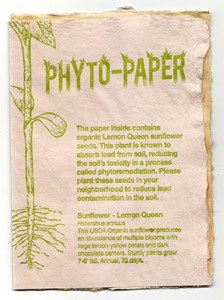In honor of Jane Addam’s 138th birthday, the renowned Jane Addams Hull House ran a number of celebratory events in their tree-shaded courtyard, including The Feminist Village. InterArts faculty Miriam Schaer and Melissa Potter were invited to show projects, along with CBPA alumni Maggie Puckett and Trisha Martin. The Feminist Village also featured many other dynamic activists, artists, and feminist organizations that are active in Chicago. Visitors to the Village showed interest and enthusiasm for CBPA’s new and ongoing feminist projects.
Projects that caught visitors’ attention and generated lots of questions included the 2012 CBPA collaboration with the Guerilla Girls in the paper studios and Columbia galleries; Laura Anderson Barbata’s Juliana Pastrana Repatriation Project, which has been recently celebrated in international media; and the current project by InterArts Assistant Professor Melissa Potter’s Gender Assignment Project, which is currently on display at the at Columbia’s A+D Gallery Construction show, curated by Sabina Ott. The show runs through September 21, and visitors to the gallery for the closing reception on September 18 (5:00–8:00 p.m.) will still be able to take the Gender Assignment Assessment, and have their results added to the final blog post.
Other projects shown at the Feminist Village included InterArts faculty member Miriam Schaer’s on-going project Babies Not On Board, concerning social stigmas about childless women; CBPA alum and part-time faculty Maggie Puckett shared her work on the Phyto Paper Project; and CBPA Alumna Trisha Martin displayed and discussed with visitors the hand made paper products she created at Hardin ng Kalikasan (Nature’s Garden in Tagalog, Tagalog, the national language of the Philippines) in Quezon Province, Philippines. Martin created the work during her 2010 residency at the Quezon women’s papermaking micro-industry. Martin talked about her activist work as a natural progression from her family influences: her father was an activist in the Philippines during his college years, and her grandfather, who Martin says has exerted the greatest influence on her work, was the founder of an agricultural college. More information about Martin’s work can be found here.



